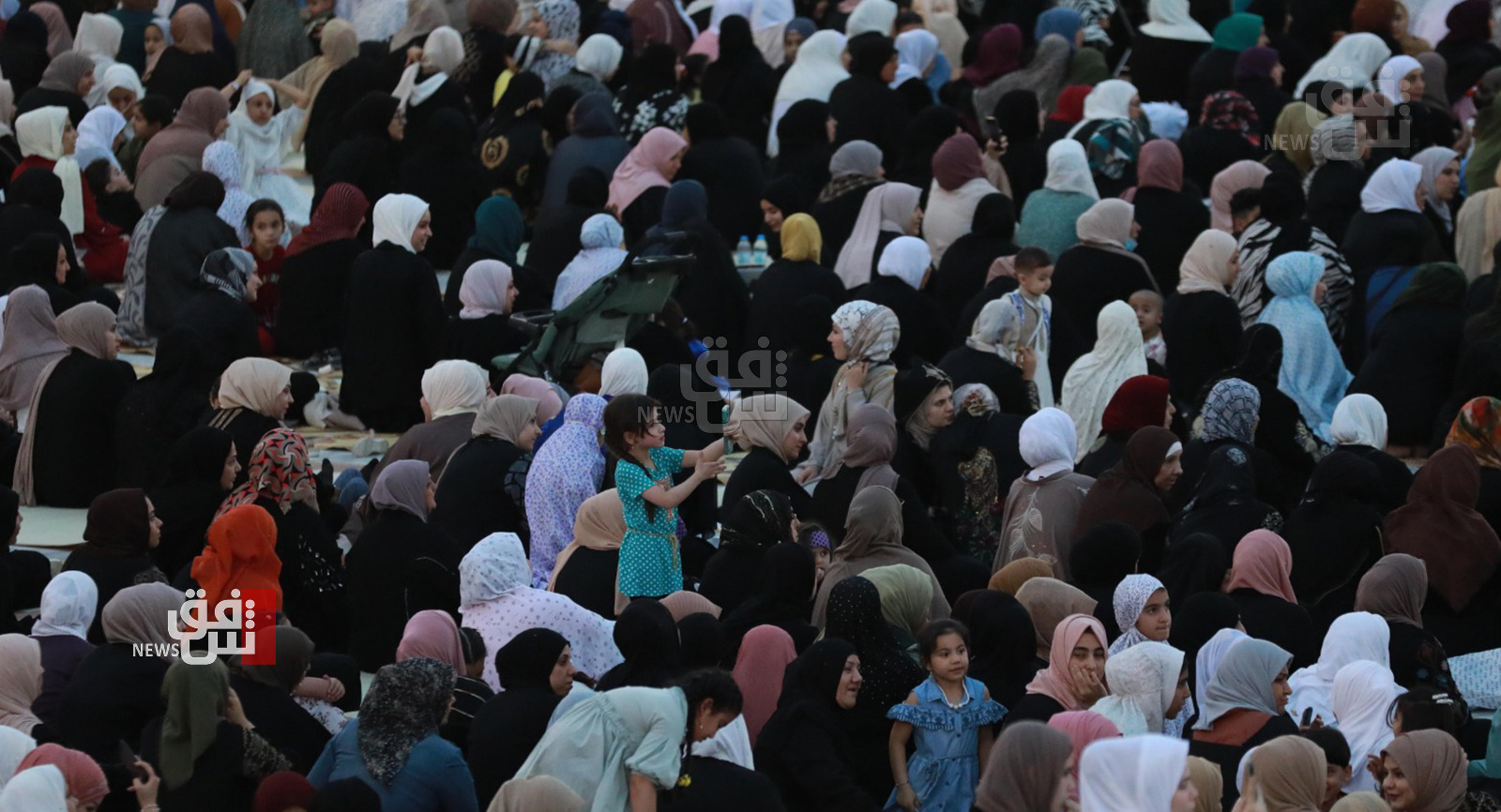Temporary marriage in Iraq: economic pressures, legal controversies, and societal dynamics

Shafaq News / In Iraq, the prevalence of "temporary marriage" has become a common phenomenon, primarily attributed to economic factors, according to experts. Alia, a 33-year-old Iraqi citizen, serves as an example of this trend, having entered into a temporary marriage that lasted three months before the couple went their separate ways.
Alia, a divorced mother of three, shed light on the underlying reasons behind this practice, stating, "Women are sometimes compelled by financial necessity to enter into temporary marriages to support their families, particularly in cases where their husbands have passed away or divorced them, leaving them without a breadwinner."
Speaking to Shafaq News agency, she revealed that she herself had "entered into a marriage contract for three months, as stipulated, before parting ways."
Warda al-Khatib, a social researcher, highlighted that various factors contribute to the rise of temporary marriages in Iraq, with economic need being the most significant. She emphasized that women often feel compelled to resort to temporary marriages in order to provide for their children. Al-Khatib further identified additional factors, such as the age of unmarried women, the high number of divorced and widowed women, and the reluctance of men to enter into permanent marriages with them. Consequently, women turn to temporary marriages as a means to fulfill their sexual desires while upholding their sense of chastity.
The topic of temporary marriages has sparked considerable debate due to differing opinions on its validity within Islamic law. Sheikh Muhammad Khalil Ibrahim, the deputy religious leader in Baghdad, shed light on the subject, noting both similarities and differences between temporary and permanent marriages.
Ibrahim outlined the following similarities between temporary and permanent marriages:
1-Equality: In both types of marriages, women must be of mature age and free from any restrictions. As a result, it is prohibited to marry women who are already married, in mourning following a death or divorce, prohibited due to lineage, affinity, or breastfeeding, or non-Muslim women. Additionally, a woman can only enter into a temporary marriage with a Muslim man free from any restrictions.
2-Contractual Formalities: Temporary marriage, like permanent marriage, requires a verbal contract with explicit intent.
3-Gender Parity: Temporary marriage mandates a contract for both men and women, similar to permanent marriage.
4-Sanctity and Restrictions: Temporary marriage carries similar sanctity as a long-term union, as the married woman is forbidden from marrying her husband's relatives for life, and her daughter from the temporary marriage is considered the husband's stepdaughter. Furthermore, just as in a permanent marriage, two sisters cannot be simultaneously married in a temporary union.
5-Rights and Obligations: Children from temporary marriages enjoy the same rights as those from permanent marriages, including inheritance and financial entitlements.
6-Parentage and Legitimacy: Once the couple engages in sexual activity, any resulting child is considered the husband's, as both temporary and permanent wives hold legitimate spousal status.
7-Dowry and Agreement Validity: The dowry in temporary marriage is equivalent to that in permanent marriage, and all agreed-upon terms are binding.
8-Divorce Settlement: If the husband divorces the wife before engaging in sexual activity, she is entitled to half of the dowry, referred to as the "so-called dowry." However, if the specified time in the contract elapses without sexual activity occurring, the wife is entitled to the full dowry, while some argue that she is entitled to half.
-Distinctions Between Permanent and Temporary Marriages:
Certain aspects differentiate permanent and temporary marriages, as elucidated by Sheikh Muhammad Khalil Ibrahim:
'Iddah Period: In the case of retreat without sexual activity, both permanent and temporary marriages do not impact the dowry or the 'iddah period. However, if the temporary marriage is consummated, the temporary wife must observe the 'iddah period, similar to a permanent wife who undergoes divorce without consummation. Regardless of consummation, both temporary and permanent wives are obligated to complete the full 'iddah period following the husband's death.
Contractual Conditions: Any conditions permissible in Islamic law stipulated by either party in the contract hold equal validity in both permanent and temporary marriages.
Menstruation Prohibition: The prohibition of approaching the wife during her menstrual period applies to both temporary and permanent marriages.
Corrupt Contract: If a contract is later deemed corrupt due to a prohibited reason, its validity depends on whether the marriage was consummated. If the marriage was not consummated, the wife receives nothing of the dowry. However, if consummation occurred and the corrupt nature of the contract was not known to the wife, she is entitled to the full dowry, following the ruling applicable to permanent marriages. If the wife was aware of the prohibition and still accepted the marriage, she forfeits everything due to being deemed an adulteress.
Marrying Nieces: In both temporary and permanent marriages, the husband is prohibited from marrying any of the temporary wife's nieces without her permission, mirroring the ruling in permanent marriages.
Furthermore, Sheikh Muhammad Khalil Ibrahim identified additional discrepancies between permanent and temporary marriages:
-Specifying the Duration: In a temporary marriage contract, a fixed and unalterable period must be specified. In contrast, under no circumstances can the duration be included in a contract for a permanent marriage.
-Significance of Dowry: The absence of a dowry mentioned in a temporary marriage contract renders the contract null and void, as the dowry is one of the fundamental pillars of temporary marriage. While the dowry holds less significance in permanent marriages, the husband who consummates the union remains obligated to pay the same women's dowry.
-'Iddah Waiting Period: If the temporary or permanent wife divorces before consummation, no 'iddah waiting period applies. However, if divorce occurs after consummation and the wife is not pregnant, she must observe the 'iddah period for three menstrual cycles. If she is pregnant, she must hold the 'iddah period until delivery. For the temporary wife, the waiting period is until childbirth if she is pregnant, lasting for 45 days. In the event of the husband's demise, both permanent and temporary wives must observe a waiting period of four months and ten days after giving birth.
-Inheritance Discrepancy: There exists a divergence of opinion regarding the inheritance rights of spouses in temporary marriages, as the marriage contract does not inherently determine the presence or absence of inheritance. If a condition regarding inheritance is stipulated, it must be adhered to.
-Alimony Entitlement: The temporary wife is not entitled to alimony unless specified in the contract, while the permanent wife retains the right to claim alimony.
-Marriage of Virgins: Temporarily marrying virgins is considered unfavorable, whereas permanently marrying virgins is always permissible.
-Conjugal Rights: The permanent wife has the right to demand that the husband spend one out of every four nights sleeping beside her, facing her, and engage in sexual contact at least once every four months. However, the decision-making authority lies solely with the husband, and the temporary wife has no jurisdiction to make such demands.
Divorcing the permanent wife retroactively after consummation allows the husband to reconcile with her before the 'iddah period expires. In the case of khul' divorce, initiated by the wife due to her dislike for the husband, she has the right to return as long as she is still within the 'iddah period. However, for the temporary wife, the separation occurs as soon as the specified period expires.
Neither the husband nor the wife can reconcile during the 'iddah period in temporary marriage. In contrast, in permanent marriage, they have the option to renew the contract while the wife is in the 'iddah period. Others are not permitted to propose marriage to the wife until after the 'iddah period has ended.
If the permanent marriage is consummated, the wife receives the entire dowry. However, if she later refuses to share the husband's bed, she may lose alimony, which is provided in exchange for submission. The husband may also deduct money from the wife's dowry proportionate to the duration she refused to join him in bed after the completion of the temporary marriage.
Regarding the number of spouses, a man may have up to four permanent wives simultaneously. However, the number of temporary wives cannot exceed four, according to some scholars, similar to the restriction in permanent marriage.
Regarding the concept of "void marriage," Dr. Omar Hussein, a professor of Jurisprudence and Fundamentals of Religion, explains that including corrupt conditions in the contract, such as the non-permanence of marriage, renders it invalid. Temporary marriage is considered void in the doctrines of Sunnis and most Shiites, except for Imami Shiites who allow it under specific conditions according to their jurisprudence.
Dr. Hussein states that Sunnis consider temporary marriage invalid because marriage is intended for stability and permanence. Any condition in the contract that violates this permanence renders the marriage invalid. However, if both the husband and wife mutually intend for a temporary marriage for a specific period, the contract is considered valid.
Regarding misyar marriage, Dr. Hussein explains that the contract is valid as no specific time duration is specified. In misyar marriage, spouses waive certain rights, such as alimony and shared residence. For example, if they live in separate places, they are still considered married, and the wife cannot remarry during the husband's absence. In this type of marriage, the wife may choose to have a permanent marriage while waiving certain rights, such as financial support if she is self-sufficient.
Dr. Hussein notes that due to wars and a large number of women, coupled with the reluctance of young people to marry, some women may seek a husband solely to fulfill their instincts. From a legal perspective, this is one of the purposes of marriage. Misyar marriage is considered permanent, witnessed, and conducted in the presence of the wife's guardian. However, it involves waiving certain rights, which is within an individual's right to do so.
Under Iraqi law, Azhar al-Dulaimi, the head of al-Asl Organization for the Empowerment of Women and Children, asserts that the temporary marriage contract is considered invalid due to its lack of continuity, which is a requirement for marriage contracts under the Civil Status Law No. 188 of 59.
Al-Dulaimi cites various cases involving children born from temporary marriages, including a decision by the Federal Court of Cassation that confirmed the paternity of a child to her father, although the marriage was considered null and void and not officially registered. She shares the story of a girl who was deceived into a temporary marriage, being promised a long-term union in a personal status court. Verbal agreements between men and women hold no legal weight in personal status matters, and the person responsible for the deception faced legal consequences as per relevant provisions. Al-Dulaimi emphasizes that only marriage contracts issued by authorized marriage offices ratified by clerics are considered valid under Iraqi law.





